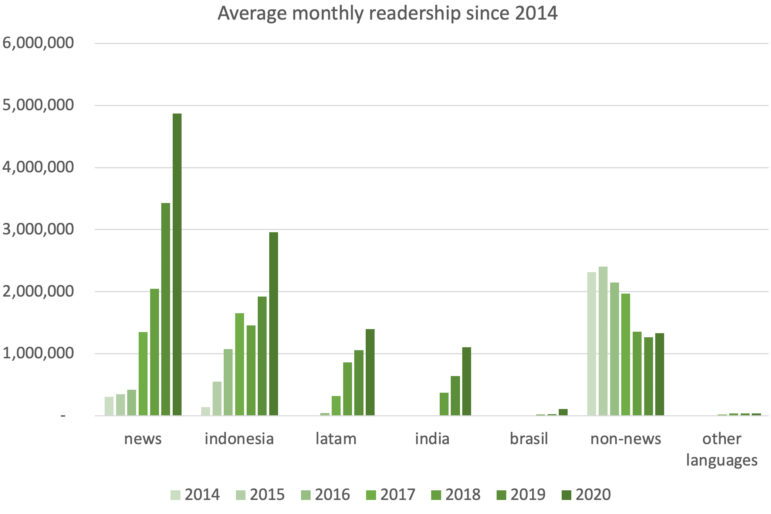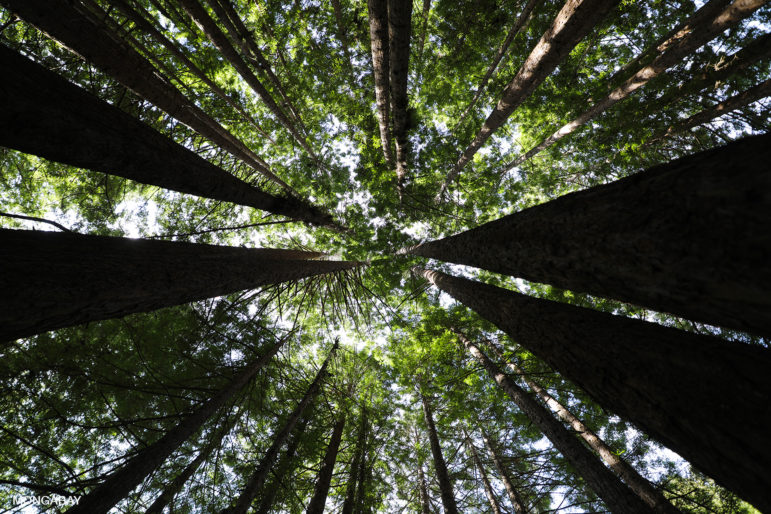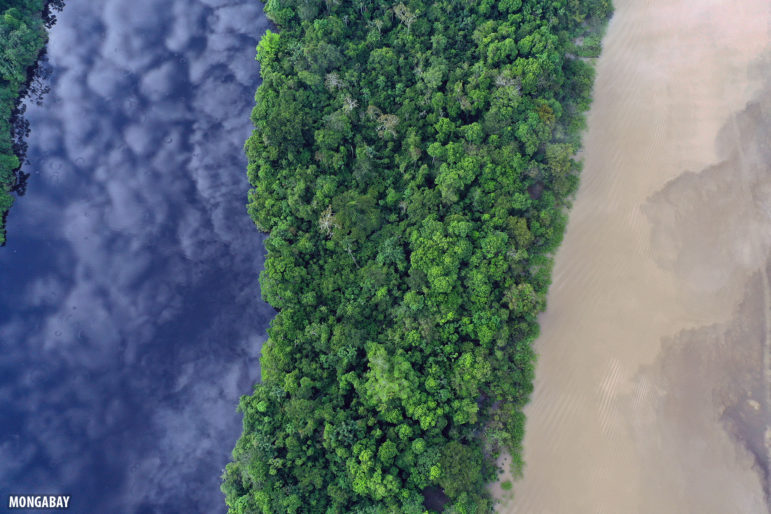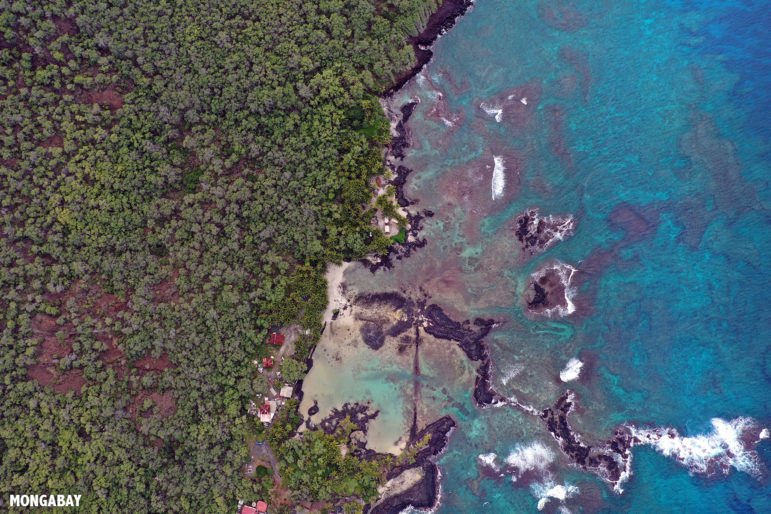Between the pandemic, widespread environmental policy setbacks, devastating fires and storms, civil strife, and rising authoritarianism, 2020 was a challenging year. Mongabay persevered through these difficult times, supporting its staff and contributor network, while continuing to produce impactful reporting.
Five topline successes in 2020
Navigating the pandemic: In these times of hardship and great uncertainty, Mongabay provided stability for staff by avoiding layouts, furloughs, or salary cuts and afforded opportunities for contributing journalists in scores of countries at a time when fewer paid reporting opportunities have been available. We helped support members of our team who suffered through COVID infections and lost loved ones to the pandemic.
Readership growth: Mongabay experienced strong growth in audience, with readership rising 38% and video viewership climbing 87% over 2019. Importantly, the quality of engagement also increased with aggregate time spent on our platforms increasing 143%.
| Indicator | 2019 | 2020* | Change |
| Original articles produced | 4,644 | 5,000 | +7% |
| Pageviews | 101M | 140M | +38% |
| Video views | 44M | 75M | +70% |
* Projected as of December 22, 2020
Rising influence: Mongabay expanded our influence as evidenced by the number of news outlets that sourced information from us as well as instances of governments, international financial institutions, development agencies, and corporations citing our stories or reaching out to us for information. For example, oversight agencies in Indonesia, Ecuador, and Peru followed up on several of our exposés, launching their own investigations into instances of corruption and illegal activities surfaced by our reporting. Companies from a wood supplier in Denmark to Microsoft have informed us they use Mongabay reporting for decision making. We also established a partnership with NowThis Media, a platform that receives 2.6 billion views a month making it the top mobile news brand in the U.S.
New content development: Despite a freeze on travel implemented in March, we were able to maintain our level of content production by leveraging our global network of staff and contributors. Mongabay also expanded its content offerings, launching new video shows including Candid Animal Cam, which showcases animals in their natural habitat; mini documentaries; and explainer videos on key environmental topics. We also started producing new types of data visualizations like the Amazon fire mapper and Forest tracker maps, launched a second English podcast called “Mongabay Explores” (season 1 on the salamander pandemic, season 2 on Sumatra), and established a Hindi-language bureau to reach the 700 million people who speak the language in India. Mongabay-Indonesia, Mongabay-Latam, and Mongabay-India also established podcasts.
Peer recognition: Mongabay received several accolades for our reporting in 2020. These ranged from awards for investigative reporting on threats to environmental defenders in Latin America to pangolin poaching in Asia to alleged corruption in the Indonesian palm oil sector.
DONATE TO SUPPORT MONGABAY
Selected impacts
- Strengthening accountability: A federal government oversight body told Mongabay it is using our reporting to investigate potential misconduct by a government agency.
- Informing decision makers: On several occasions, provincial and central government officials contacted Mongabay Indonesia for briefings on illegal clearing of mangroves, peatlands, and forests. Meanwhile officials with the World Bank said the institution has been using Mongabay reporting to track the potential implications of Indonesia’s omnibus bill. Officials at the U.S. State Department, USAID, USFWS, Norway’s overseas development agency NORAD, Britain’s DFID, and the French Development Agency all reached out during 2020 to say they rely on Mongabay’s reporting on forests, oceans, wildlife, and conservation issues. The government of Paraguay announced that they will take measures to arrest deforestation in the Atlantic Forest after officials read Mongabay-Latam’s reporting on the issue.
- Improving transparency: In the wake of publication of Mongabay’s investigation into a suspicious $22m payment made by Korindo to an unnamed consultant, a number of NGOs mobilized to raise attention around the case, and Indonesia’s anti-corruption agency, the KPK, reached out seeking primary sources and other data. Also, in November 2020, a few months after Mongabay published its report, the BBC published an investigation into the alleged intentional use of fire by Korindo in the same plantation concessions we wrote about in Papua. The deputy chairman of the Indonesian parliament’s Commission IV has since launched an investigation into Korindo’s activities.
- Identifying solutions: Mongabay’s coverage of effective solutions informed funders, NGOs, and other actors about what is actually working. For example, staff from Indonesia’s Executive Office of the President used information from a Mongabay Indonesia story on a local irrigation model practiced in East Nusa Tenggara, while several projected covered by Mongabay’s WildTech initiative received invitations to apply for funding from U.N. agencies and philanthropic foundations.
DONATE TO SUPPORT MONGABAY
Awards and accolades
- Mongabay and its “Indonesia for Sale” series partner The Gecko Project were honored with a Fetisov Journalism Award for its investigative reporting on the opaque deals underpinning Indonesia’s deforestation and land rights crisis. The series was also recognized by the Society of Environmental Journalists (SEJ) with the Kevin Carmody Award for Outstanding In-depth Reporting.
- Mongabay writer, Karla Mendes, and Mongabay editor, Jeremy Hance, each took the top two awards in the Outstanding Explanatory Reporting category in the Society of Environmental Journalists (SEJ) 19th Annual Awards for Reporting on the Environment. Karla won for a project with Max Baring published by Thomson Reuters: “Fears over rising violence in Amazon as ‘forest guardians’ battle logging.” Jeremy won second place for his series “The Great Insect Dying” which chronicles the global decline of insects in extraordinary detail.
- Mongabay Latam participated for a second consecutive year in an effort carried out by 45 journalists from ten Latin American countries to build a database that documents episodes of violence. This year, the collaborative work received an honorable mention in the Interamerican Press Society Excellence Journalistic Competition in the Environment category.
- Mongabay won a “Pongo Award” from the Orangutan Republik Foundation for our coverage of environmental issues and information on tropical rainforests. Actor Ed Begley presented the honor.
- Mongabay Indonesia and Mongabay India were part of the collective, The Pangolin Reports, that won two awards for reporting on pangolins from the Society of Publishers in Asia Awards as well as a prize from the Online Journalism Awards, Sahana Ghosh and freelancer Anup Sharma contributed to the series for Mongabay India, while Tommy Apriando was the lead on the project for Mongabay Indonesia. Tommy died suddenly February 1st this year at the age of 30.
- Jackson Wild selected Mongabay Latam staffer Romi Castagnino as one of their distinguished Fellows for the 2020 Jackson Wild Media Lab. Romi hosts our Candid Animal Cam video series.
- com, a payments services platform, cited Mongabay as an example of best practice in a case study on how we increased efficiency in paying contributors in more than 90 countries.
- The Saving Aru film won the Conservation Optimism film festival.
- Our Mothers’ Land, Mongabay and its “Indonesia for Sale” series partner The Gecko Project, was chosen as an Official Selection for the 19th annual Wild & Scenic Film Festival.
Partnerships
- Mongabay Latam established a distribution partnership with the Mexican Radio Institute (IMER), the largest public radio service in Mexico with an audience of approximately 40 million people. IMER is adapting Mongabay Latam stories into radio reports.
- We established new syndication arrangement for Mongabay’s podcast with large podcast network iHeartRadio’s new ECOchannel and National Science Foundation’s Science Zone Radio.
- Mongabay’s growing video program entered a formal partnership with WaterBear, an environmental media streaming service that looks to launch in 2021. We are actively exploring other video production partnerships with other entities that grant greater exposure for Mongabay content and expanded opportunities for our contributors.
- Pratham, an educational non-profit that reaches millions of Indian children each year, asked Mongabay India to use content for its education materials.
- Mongabay-Latam established partnerships with El Tiempo in Colombia, Vice Latin America, Efe Verde, and LA Verdad and Tec Review in Mexico. World Economic Forum
Highlighted content
The COVID crisis forced Mongabay to adapt to reporting with very limited travel. Nonetheless we were able to proceed with every major series we envisioned at the start of 2020 as well as do in-depth reporting on the impacts of COVID on conservation, wildlife, and vulnerable communities. New series included:
- Land rights and extractive industries: a global look at the impact of extractive sectors on indigenous peoples and local communities.
- Cerrado and Chaco ecosystems: a deep dive into the dry forest and wooded grassland ecosystems of South America, which face an onslaught of large-scale agriculture and ranching.
- Apes: continuing coverage of threats to apes species around the world, as well as the institutional and grassroots efforts to save them.
- Reforestation: an analytical reporting project designed to shed light on what is known and what isn’t well understood about tree-planting strategies and their results.
- Women and gender in the conservation sector, which highlights success stories where women have overcome social, cultural, economic barriers and also offers examples of nature-based solutions led by women. This included a sub-series on Amazon Women: a series on women leading and managing conservation solutions aimed at protecting forests, sustaining communities, and addressing climate change in the Amazon.
- Mongabay-India’s Wetland Champions that explores success stories in wetlands conservation in India.
- Mongabay-India’s Just Transitions, a series of stories that looks deeply into whether the transitions into and out of mining in the country are ‘just’ towards the environment and the community
- Mongabay-India’s Beyond Protected Areas, a series which looks at what happens to the wildlife that live outside national parks and wildlife sanctuaries.
- Mongabay conducted in-depth investigations into illegal logging in Cambodia, the impact of bauxite mining, World Bank funding of factory farms, coal mining in Indonesia, and the rise and fall of a billion-dollar commodities cartel in Eastern Europe; NEED MORE
- Over the course of the year, we published hundreds of commentaries and op-eds from a wide range of voices. These included pieces from a member of Knasaimos-Tehit people in South Sorong Regency in West Papua Province on what the forest means to his community; a Marubo tribemember who called the world’s attention to the impact of COVID on Indigenous Peoples; and a group of 20 African women from nearly a dozen countries who called out “subtle racism” in the conservation community.



